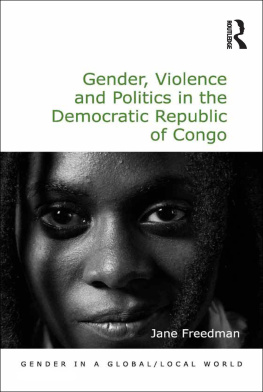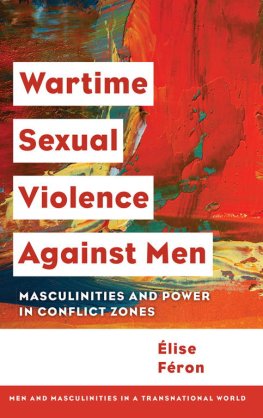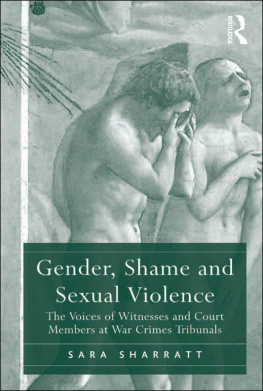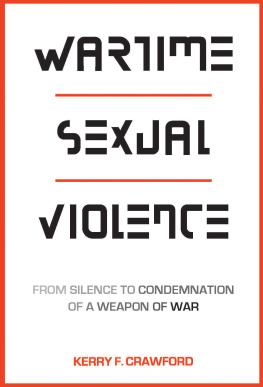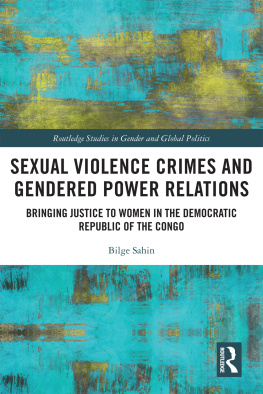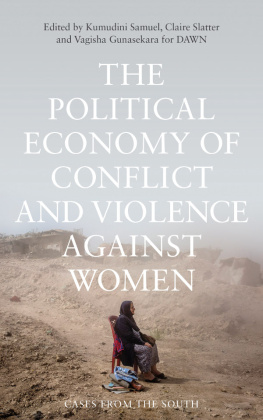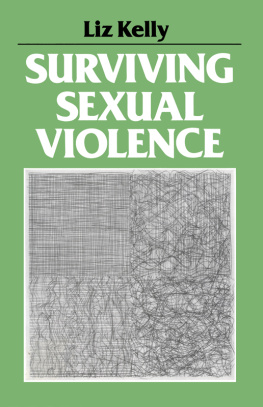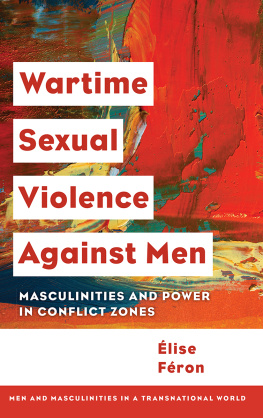GENDER, VIOLENCE AND POLITICS IN THE DEMOCRATIC REPUBLIC OF CONGO
Gender in a Global/Local World
Series Editors: Jane Parpart, Pauline Gardiner Barber and Marianne H. Marchand
Gender in a Global/Local World critically explores the uneven and often contradictory ways in which global processes and local identities come together. Much has been and is being written about globalization and responses to it but rarely from a critical, historical, gendered perspective. Yet, these processes are profoundly gendered albeit in different ways in particular contexts and times. The changes in social, cultural, economic and political institutions and practices alter the conditions under which women and men make and remake their lives. New spaces have been created economic, political, social and previously silent voices are being heard. North-South dichotomies are being undermined as increasing numbers of people and communities are exposed to international processes through migration, travel, and communication, even as marginalization and poverty intensify for many in all parts of the world. The series features monographs and collections which explore the tensions in a global/local world, and includes contributions from all disciplines in recognition that no single approach can capture these complex processes.
Gender, Violence and Politics in the Democratic Republic of Congo
JANE FREEDMAN
Universit de Paris 8, France
First published 2015 by Ashgate Publishing
Published 2016 by Routledge
2 Park Square, Milton Park, Abingdon, Oxon OX14 4RN
711 Third Avenue, New York, NY 10017, USA
Routledge is an imprint of the Taylor & Francis Group, an informa business
Copyright Jane Freedman 2015
Jane Freedman has asserted her right under the Copyright, Designs and Patents Act, 1988, to be identified as the author of this work.
All rights reserved. No part of this book may be reprinted or reproduced or utilised in any form or by any electronic, mechanical, or other means, now known or hereafter invented, including photocopying and recording, or in any information storage or retrieval system, without permission in writing from the publishers.
Notice:
Product or corporate names may be trademarks or registered trademarks, and are used only for identification and explanation without intent to infringe.
British Library Cataloguing in Publication Data
A catalogue record for this book is available from the British Library
The Library of Congress has cataloged the printed edition as follows:
Freedman, Jane.
Gender, violence and politics in the Democratic Republic of Congo / by Jane Freedman.
pages cm. -- (Gender in a global/local world)
Includes bibliographical references and index.
ISBN 978-1-4094-6778-6 (hardback) -- ISBN 978-1-3155-8416-4 (ebook) -- ISBN 978-1-3171-2984-4 (epub) 1. Women--Violence against--Congo (Democratic Republic) 2. Women--Congo (Democratic Republic)--Social conditions. 3. Sex role--Congo (Democratic Republic) 4. Womens rights--Congo (Democratic Republic) 5. Women--Political activity--Congo (Democratic Republic) I. Title. II. Series: Gender in a global/local world.
HV6250.4.W65F735 2015
362.88082096751--dc23
2015011038
ISBN 9781409467786 (hbk)
ISBN 9781315584164 (ebk-PDF)
ISBN 9781317129844 (ebk-ePUB)
Contents
Series Editors Preface
Jane Freedmans Gender, Violence and Politics in the DRC adopts a gender lens to explore the ways gendered structures and relations of power have affected the experiences of women and men living in the Democratic Republic of the Congo (DRC), as well as the ways in which national and international politics and policies have helped to construct and reinforce these gendered relations. The book moves beyond a description and condemnation of sexual and gender-based violence in the DRC to interrogate the larger picture regarding the various struggles for womens rights and gender equality in the nation. Freedman draws on her research between 2008 and 2014, which involved interviews with both Congolese and international key informants, focus groups, observations in policy making fora as well as literature reviews, in order to understand the complex environment shaping gendered practices in the DRC during this period.
Freedman frames her analysis in the broad historical trajectory from pre- to post-colonial times. She concludes that colonial discourses and norms regarding gender, constructed in an oppressive colonial economic system, have played, and continue to play, an important role in gendered assumptions and practices in the DRC. This history has influenced womens experiences of conflict in the Congo, who, she argues, were not only victims, but also participants and combatants. She demonstrates that the impact of conflict on relationships between men and women has been deeply influenced by their relative economic, political and social positions over time. Consequently, Freedman argues that gender-based violence (GBV) cannot be explained merely as a consequence of war. She adopts a broader understanding of violence, which moves beyond rape and sexual violence to argue that the roots of GBV are situated in gender inequalities which must be understood and challenged if this violence is to be contained.
Freedman takes up the societal practices that buttress gender-based violence in the DRC, particularly the mechanisms that exclude most women from formal political and economic structures and leadership. She questions the effectiveness of recent efforts to improve womens access to political and economic institutions, and positions of leadership. In her final chapter, Freedman explores the potential of international actors and institutions, such as the UN peacemakers, the International Criminal Court and other actors such as international organizations and NGOs, to reduce sexual and gender-based violence in the DRC. She argues that these interventions have frequently had unintended and negative consequences, which have sometimes even intensified gender based violence in the DRC. The book concludes with reflections on possible ways forward, which will require more effective cooperation between international and local actors, and innovative collaborative approaches. As such Freedmans analysis goes beyond the case study of the DRC and is useful for academics and practitioners interested in social, political and economic continuities pre- and post-conflict. Gender, Violence and Politics in the DRC contributes to the series on-going conversations about gender, conflict, policy and change. It is a welcome addition to this debate and to the series.
Jane L. Parpart
Pauline Gardiner Barber
Marianne H. Marchand
Introduction
Returning from one of my first visits to the Democratic Republic of Congo, I boarded the plane at Kinshasa airport, my bag full of notes, and my mind busy trying to fit together all I had learned from interviews, meetings and observations. A Congolese man sat down next to me and started a conversation about my trip and what I had been doing in the DRC. When he learned about my research and interest in gender relations in the country he turned to me with a smile. You have to understand, he told me, women in Congo are not like European women. Sometimes they are too strong and too dominating, and we men need to use some force to control them. This comment could be seen at first sight to sum up attitudes towards women in the DRC, and the normalisation of male violence towards women. I had already heard from many men and women how tradition dictated that men should be the master of the family and that their wives should remain subservient. Putting these types of remark together with media reports on male violence against women in the DRC, it would be easy to subscribe to a wholly pessimistic view of Congo as the worst place in the world for women, a country of unbridled patriarchy, where women have no rights and are dominated by men. On the other hand, I had also met many people and had many experiences during my research, which did not support this black and white view of Congolese society. Many women who were playing important roles in families, communities and public space, women who were defending their rights and making decisions, women whose economic activities supported not only themselves but their families and many other members of extended families. These contrasting and sometimes contradictory perceptions of Congolese women and men pointed to a more complex and multi-faceted picture than that which might be imagined if one took account only of some of the headline reports in the world media.

